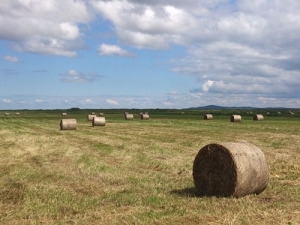Early drought fears ease in Hawke’s Bay, but caution remains
Fears of a serious early drought in Hawke’s Bay have been allayed – for the moment at least.
 Wanted: people who know what to do when the going is really, really tough – as in the drought in Canterbury.
Wanted: people who know what to do when the going is really, really tough – as in the drought in Canterbury.
Wanted: people who know what to do and do it well, especially when the going is really, really tough – as in the drought in Canterbury.
Call it leadership, a quality that stands out in one who walks the talk and gets it right, rallying men and women to a cause greater than the sum of its parts. Such leaders will be tough and single-minded – often prickly buggers – but they go for it.
Take Captain Charles Upham, VC & Bar: there's a rugged Canterbury son. Knew what to do on Crete (1941) and in Egypt (1942) and knew how to face down Hitler's mob when they finally got him behind barbed wire (1942-45).
We hope the analogy won't embarrass North Canterbury Veterinary Clinics, but we see their drought leadership reflecting something of Upham's spirit. Their drought 'toolbox' is helping farmers cope with the worst drought in living memory.
This four-clinic practice in January 2015 predicted what was coming and got busy. From a meeting with farmers at Cheviot came an action plan and the 'toolbox' to avert or deal with animal suffering and to guide farmers and their families under pressure from the big dry.
The vets, backed by the North Canterbury drought relief committee, began visiting farms – as many as they could, free of charge for two to three-hour visits. They reviewed the position of each farm, looked at its plans, and gave advice and support. This is practical farming stuff but it stands for something more: the help needed at the farm kitchen table or office desk where the telling paperwork lies – bank statements, invoices, school notices about uniforms and stationery and stuff.
Whole communities were involved of course: people getting together for the common good – farm field days, fun nights out and so on. It dealt with isolation, signalled help at hand, got farmers thinking 'outside the square' for a better outcome and a stiffer hedge against possible disaster.
All this takes leadership – the unflinching calm of a professional trained to do the job and do it well, in a way that gives people confidence and hope. Such was the vets' contribution.
And here two things must be said about the veterinary profession: its members suffer rather more than normal from depression (even tending more suicidal) and their incomes are not flash.
Three cheers for these professionals.
A New Zealand dairy industry leader believes the free trade deal announced with India delivers wins for the sector.
The Coalition Government will need the support of at least one opposition party to ratify the free trade deal with India.
Primary sector leaders have welcomed the announcement of a Free Trade Agreement between India and New Zealand.
At Pāmu’s Kepler Farm in Manapouri, mating has wrapped up at the across-breed Beef Progeny Test.
More than 150 people turned up at Parliament recently to celebrate the 20th anniversary of Horticulture New Zealand (HortNZ).
Biosecurity New Zealand says Kiwis should continue to keep an eye out for yellow-legged hornets (Vespa velutina) over the holiday season.